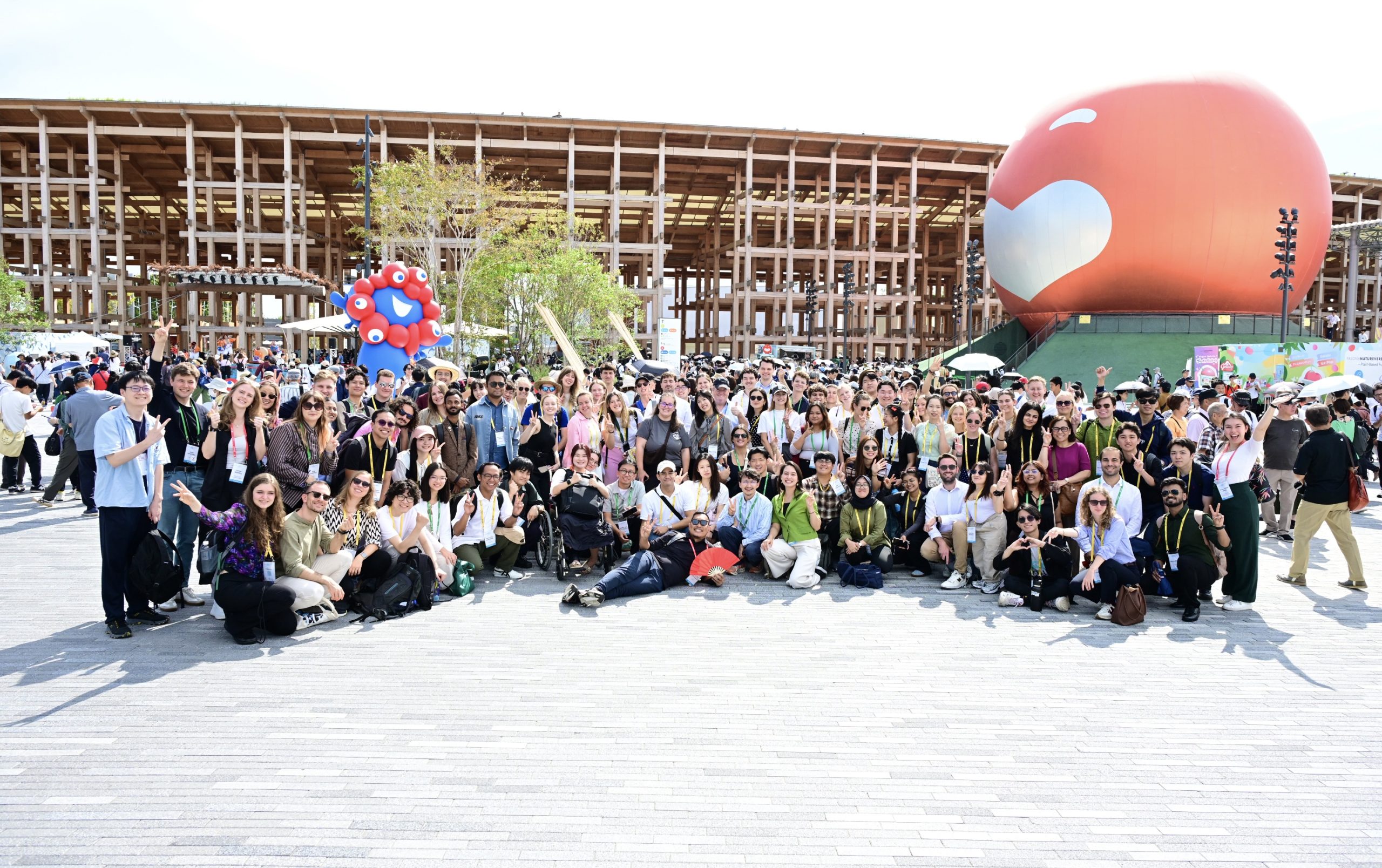WHAT WAS THE 6TH ASEF YOUNG LEADERS SUMMIT IN OSAKA, JAPAN?
Between 29 September-5 October 2025, the in-person Youth Summit of the 6th ASEF Young Leaders Summit took place in Osaka, Japan.
The Youth Summit was the culminating phase of the 6th ASEF Young Leaders Summit – a 2-month leadership development programme on the topic of ‘Leadership in Society 5.0’, which connects young people across Asia & Europe, applying a 360 degree approach on leadership development and community engagement: 1) self-leadership (you), 2) team leadership (we) and 3) societal leadership (all).
The large-scale Youth Summit brought together 89 participants from 50 countries from Asia and Europe to Japan and Osaka for a week long programme filed with intellectual exchange, intercultural learnings, and sharing of different perspectives for both the personal and professional development of young leaders.
Watch the Highlights from the 6th ASEF Young Leaders Summit in Osaka, Japan below!
ORGANISATION AND SUPPORT
On behalf of the Asia-Europe Foundation (ASEF), Ambassador Beata STOCZYŃSKA, Executive Director, Asia-Europe Foundation (ASEF) opened the programme on 30 September 2025, after the welcome dinner on 29 September graciously hosted by the Ministry of Foreign Affairs Japan (MOFA Japan). With warm hospitality, MOFA underscored Japan’s commitment to fostering dialogue and international collaboration, offering participants a glimpse of the spirit of cooperation that would guide the Summit.
We welcomed representatives from our partners and Ambassadors and representatives from ASEF embassies in Osaka and Tokyo to officially kick off the programme. The 6th ASEF Young Leaders Summit could not have been possible without the partnership of the Japan Hub for Innovative Global Education (JIGE), coordinated by the Institute for Innovative Global Education (IIGE) at Kansai University, an educational and workforce development initiative promoted by Kansai University, Chiba University, and Tohoku University. We are grateful to Professor Tomoyuki TAKAHASHI, President of Kansai University for hosting us and to Professor Keiko IKEDA, Vice-Director, Institute of Innovative Global Education, Kansai University and her team for their incredible work.
Thank you also to the of the Ministry of Foreign Affairs of Japan for hosting the welcome dinner and supporting the programme. A special thank you to Ambassador Katsuro KITAGAWA, Director-General of the European Affairs Bureau / Assistant Minister, Ministry of Foreign Affairs of Japan and Ms Yamada KAZUMI, Director, Asia-Europe Cooperation Division, Ministry of Foreign Affairs of Japan for welcoming the participants.
To the Ministry of Education, Culture, Sports, Science and Technology (MEXT), and Ms Naoko HIRAYAMA, Director, International Affairs Division at MEXT for your support of youth development and education. We are also very grateful for the intellectual partnership from the Copenhagen Institute of Futures Studies (CIFS) and the Tech For Good Institute.
Our appreciation extends to our supporters, the youth and student organisations in Asia and Europe): the ASEAN Youth Organisation (AYO), the Erasmus Student Network (ESN), the Student Think Tank for Europe Asia Relations (STEAR), the European Students’ Forum (AEGEE), the European Law Students Organisation (ELSA), the All China Youth Federation (ACYF), and European Guanxi.
A special thank you to our funders: the European Union and the Ministry of Foreign Affairs of Denmark, whose generosity sustains these opportunities for global youth leadership.
PROGRAMME
DAY 1: HUMAN CENTERED LEADERSHIP FOR SOCIETY 5.0
Marking the start of the Summit’s intellectual programme, Professor Yuko HARAYAMA, Professor Emeritus at Tohoku University and an active member of the international framework Global Partnership on AI (GPAI), delivered the first keynote. She posed a fundamental question to the audience: “As AI and digital technologies rapidly transform society, can we continue to place humans at the centre?”
Professor Harayama highlighted that the future cannot be drawn as a single path; it is inherently unpredictable. What leaders need, she argued, is not to possess definitive “answers,” but to maintain the courage to keep asking questions. Seeking too much certainty or comfort risks stifling the seeds of learning and growth.
She went on to say that “the starting point of leadership lies in self-understanding.” Before contributing to society as leaders, we must first know ourselves—our values, our desires, and what truly matters to us. “Do not be afraid of the journey to discover yourself,” she urged, leaving a message that resonated especially strongly with the younger generation. Even in the digital age, it is human curiosity and the quest for self-understanding that will shape the foundation of the future.
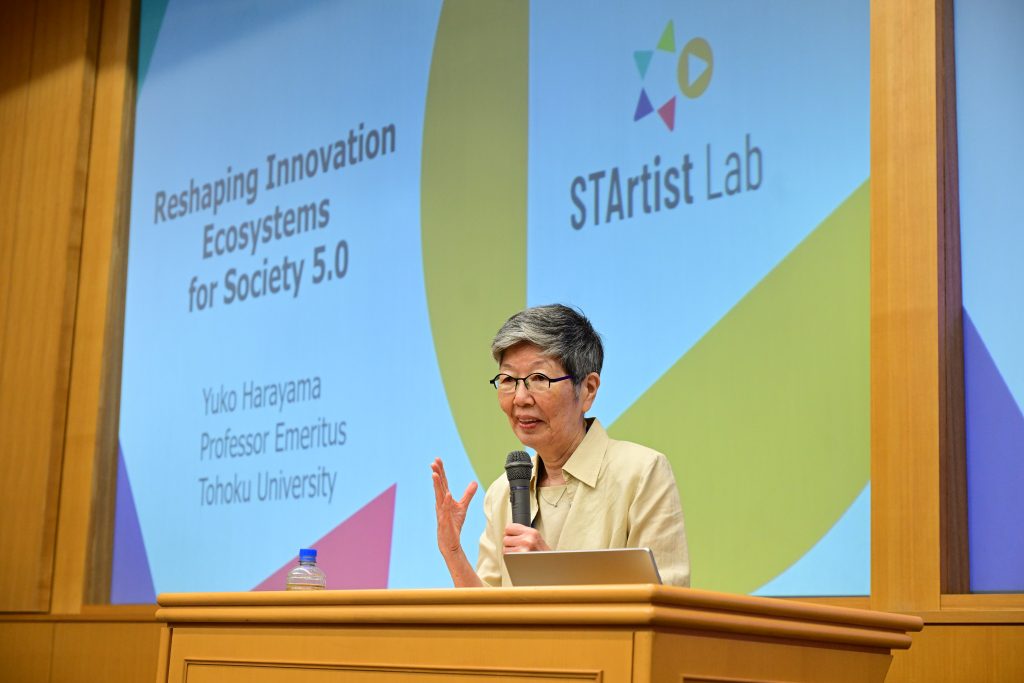
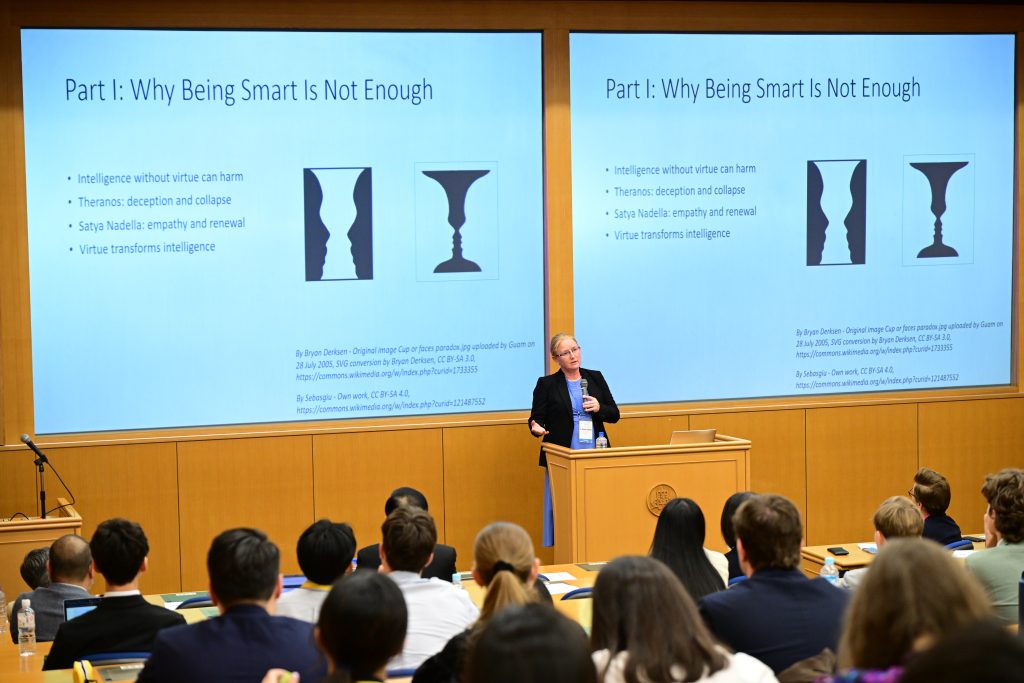
The next keynote was delivered by Dr. Špela Stres, Head of the Innovation Relay Center at the Jožef Stefan Institute in Slovenia and a board member of the European Innovation Council (EIC). Her theme was “Virtuous Leadership.” She stressed that true innovation does not emerge from the accumulation of knowledge and intelligence alone; it is only when guided by ethics and values that innovation can bring genuine benefits to society.
As a concrete example, Dr. Stres referred to the infamous Theranos scandal in Silicon Valley. Despite claims of technological breakthroughs, the absence of ethical grounding led to a massive collapse—an illustration of the reality that “knowledge and intelligence alone cannot bring happiness to people.” In contrast, she highlighted Microsoft as a company that has consistently respected culture and values while achieving sustainable growth, offering the audience a striking comparison.
What left perhaps the deepest impression was her statement: “A budget is a moral document.” A budget, she explained, is not merely a collection of numbers but a mirror that reflects what a society values and prioritises. She urged participants to pay attention to the ethical judgments and social responsibilities embedded in budget decisions, encouraging them to consider funding allocations in policy and business from a new perspective.
In closing, Dr. Stres stressed that for leaders who will shape the future, it is essential never to lose sight of culture and values. Especially in today’s world of accelerating technological change, leadership that fuses knowledge with ethics will be decisive in determining society’s sustainability. Her keynote left the audience with a powerful and lasting message.
PANEL DISCUSSION: HUMAN-CENTERED LEADERSHIP FOR SOCIETY 5.0
The panel featured Professor Yuko Harayama, Dr. Špela Stres, and Mr. Carsten BECK (Director and Futurist at the Copenhagen Institute for Futures Studies). The discussion was moderated by Ms. Freya CHOW-PAUL, Youth Project Lead at the Asia-Europe Foundation (ASEF).
At the heart of the discussion was a key question: How should leadership be redefined in Society 5.0—a human-centered society where the digital and physical merge? Traditional hierarchy-based decision-making is no longer sufficient; new mechanisms are needed to make the voices of younger generations visible and link them to actual decision-making.
When it comes to technology, the human-centered approach was repeatedly underscored. While AI and IoT continue to evolve, empathy and ethics cannot be outsourced to machines. What matters is defining in our own words what we dislike and what we want to change, and expressing this not only as criticism but also as constructive proposals. Without clear purpose, dysfunction will only repeat itself.
Getting-to-know each other sessions took place outdoors and under the warm autumn sun, creating the perfect atmosphere for connection. We started with icebreakers that brought everyone closer together—such as lining up silently according to shoe size or birth month. With gestures and smiles, participants managed to communicate, and laughter quickly filled the air.
It was a moment where cultural, generational, and individual perspectives met. Far more than an icebreaker, the activity became a powerful reminder of diversity, dialogue, and the shared hope for a future that allows more space for different definitions of success.
DAY 2: SHAPING THE DIGITAL FUTURE, CELEBRATING CULTURAL DIVERSITY
The morning began with a keynote by Mr. Nararya S. SOEPRAPTO, Deputy Secretary-General of ASEAN and ASEF Governor for ASEAN. Speaking with warmth and candor, he began by reflecting on his own “homecoming” to Indonesia after years abroad. Moving between government, the private sector, and international organisations, he came to realise how every policy decision—once made exclusively by governments—now reverberates across businesses, NGOs, and even grassroots youth groups.
He reminded participants that Society 5.0 is not a future ideal but “already our present reality,” with AI and digital tools embedded in daily life. What matters now, he stressed, is not how fast technology advances, but whether it protects human dignity, ensures inclusivity, and expands opportunity.
Closing his keynote, he turned directly to the young leaders in the room: “You are not passive beneficiaries of this transformation. You are co-creators. Your creativity, your entrepreneurship, and your responsibility will decide whether technology divides—or empowers—our societies.”
GROUP PRESENTATIONS: TECHNOLOGICAL SOLUTIONS TO SOCIETAL CHALLNEGES IN ASIA AND EUROPE
Over the course of nearly two months, the teams had collaborated across borders, engaging in online discussions and joint research. Working with peers from different nationalities and cultural backgrounds, they often challenged one another’s assumptions while also discovering fresh perspectives. The presentations they delivered reflected the depth of this process—demonstrating how diversity and collaboration can empower young leaders to put forward creative and practical solutions for Society 5.0.
Group 1: Menstruation and Sustainability
Addressed the dual challenge of period poverty and menstrual waste. Case studies from the Netherlands, Czech Republic, Singapore, and Australia highlighted reusable products, recycling technologies, and transparent carbon audits as ways to reduce environmental and social burdens.
Group 2: Inclusion of the Deaf and Hard of Hearing (DHH) Community
Explored global challenges faced by nearly 500 million people. Examples included grassroots initiatives in Bangladesh and Singapore, as well as institutional support in Spain and Romania. Emphasis was placed on AI-driven real-time translation and multipurpose interpreting services.
Group 3: Rural Healthcare and Digital Access
Compared Germany’s digital diagnostic centers, Northern Ireland’s farmer support programs, Pakistan’s e-clinics, and Australia’s nurse-led outreach. Findings underscored that digital innovation must be paired with local trust and cultural sensitivity.
Group 4: Digital Skills for All
From refugee IT training in Europe to teacher-student pipelines in rural Cambodia, and university-led coding camps in Japan, the group stressed that bridging the digital divide requires both infrastructure and context-specific education.
Group 5: Renewable Energy and Society 5.0
Showcased cases such as India’s grid efficiency upgrades, China’s AI-driven virtual power plants, Denmark’s community solar model, and Ireland’s wave energy converters. They concluded that sustainable energy transition requires not only technology but also citizen participation.
Group 6: Waste Reduction and Circular Economy
Highlighted initiatives like Thailand’s plastic recycling incentives and Europe’s “Too Good To Go” food waste prevention. The group argued that financial rewards and gamification can reshape consumer habits and promote sustainability.
Group 7: Social Housing and Resilient Cities
Case studies included Vietnam’s Macanchi Social Housing Program, Japan’s Kashiwa-no-ha Smart City, Germany’s energy-positive neighborhoods, and the Netherlands’ floating homes. The common thread: combining renewable energy, resilience, and citizen engagement for future-ready urban design.
Group 8: Enhancing Access to Reproductive Health Education
From Bangladesh, Czech Republic, Croatia and Japan, investigated ways to support women through apps, podcasts, wearable technology, and online platforms. The group underscored the importance of breaking down stigma to better support women.
Group 9: Expanding Technology Education
Covered New Zealand’s volunteer-led tech education, Indonesia’s decentralized university networks, Latvia’s government initiatives, and Germany/Austria’s low-cost practical training. The conclusion: inclusive, affordable, hands-on education is key to Society 5.0.
Group 10: Farming as an Attractive Career Path
Examined Ireland’s farm succession matchmaking, Spain’s national training programs, Thailand’s OTOP branding initiative, and India’s digital agricultural market. They emphasised reframing farming as entrepreneurship, culture, and tourism rather than only production.
PANEL DISCUSSION: HOW DO WE BALANCE ECONOMIC ADVANCEMENT WITH INCLUSION, SUSTAINABILITY AND ETHICS?
The afternoon began with a thought-provoking dialogue session with speakers Mr Jonathan Wong (ESCAP), Dr Lizan E Perante-Calina (Graduate School of Public and Development Management, Development Academy of the Philippines) and Dr Judit Erika MAGYAR (EURAXESS Japan).
The session focused on the opportunities and challenges of digital transformation and Society 5.0, sparking discussions on how to balance economic growth with ethics and sustainability. Examples from the Philippines and the EU, policy perspectives, and the role of young leaders all came into the conversation. One shared concern was clear: “Innovation has fueled economic growth, but it has also placed burdens on society and the environment. The challenge now is how to harmonise people, planet, and prosperity.”
Afterwards, participants split into breakout sessions with the speakers to explore these themes in depth. One group addressed sustainability and governance, examining the challenges of resource-dependent economies, the importance of trust between citizens and governments, and the limits and potential of multilateral cooperation. Another group discussed digital transformation and inclusive societies, weighing the promise of more efficient governance and innovation against risks such as the digital divide, data security, and AI bias.
Across all groups, a central question emerged: How can young people actively influence policies and shape the future of society?
CULTURAL EVENING
In the evening, participants came together for a vibrant Culture Evening. Sharing sweets brought from their home countries and dressed in traditional attire, they proudly showcased their cultures. The room was filled with colorful outfits and lively conversations, creating an atmosphere that felt like a truly global celebration.
With friends representing more than 50 countries, the evening was full of music, laughter, and discovery. Participants learned a Romanian wedding dance, joined in a Japanese Bon Odori, and applauded each cultural performance with enthusiasm. Each presentation brought smiles and sparked curiosity, as young leaders eagerly stepped onto the stage to share a piece of their heritage.
DAY 3: PERSPECTIVES FROM THE OSAKA EXPO 2025
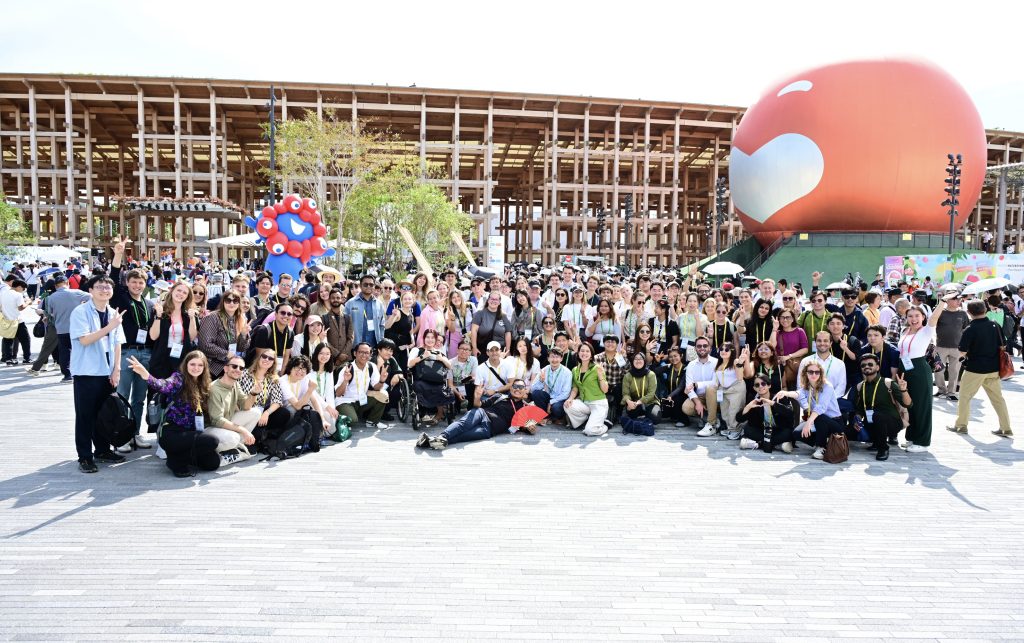
Day 3 of the programme took us to the Osaka Expo 2025. From the moment participants stepped onto the Expo grounds, the unique atmosphere of a world fair was palpable—an energy that set hearts racing with excitement. Despite the crowds gathering from early in the morning, the expressions on participants’ faces were filled with anticipation, and a sense of curiosity and wonder spread across the venue.
Throughout the day, the participants had the opportunity to visit different country pavilions. They shared their impressions with great enthusiasm: “It was wonderful to see how much pride each pavilion’s staff had in their own culture,” one noted. Another commented, “Because there were so many participants from different countries, some of us were even able to negotiate with our national pavilion staff to be given priority admission.”
A third participant added, “When I visited my own country’s pavilion, they used mist effects to recreate the feeling of a tropical forest—it felt so real. I was proud that the atmosphere and culture of my country could be experienced and appreciated by so many people.”
In addition to visiting pavilions, participants also had the opportunity to showcase their case study presentations at the Team Expo pavilion, presenting to a public audience.
EU-Japan Dialogue on Leadership in Society 5.0
In the afternoon, many gathered at the EU Pavilion for a special session on the EU–Japan Youth Dialogue on Leadership in Society 5.0. The dialogue featured opening contributions from H.E. Jean-Eric Paquet, Ambassador of the European Union to Japan, and Ms Yoko Kitaguchi, Country Representative for Japan of the Erasmus Mundus Association (EMA).
Joining them on stage were ASEFYLS6 young leaders representing Europe through ASEF’s networks: Ms Petra Gombár from Hungary, President of AEGEE-Europe (European Students’ Forum); Ms Sara Tagliabracci from Italy, Global Mobility Coordinator at the Erasmus Student Network (ESN); and Mr Théo Deswaef from Belgium, Vice-President in charge of Competitions at the European Law Students’ Association (ELSA). Each brought forward perspectives from their respective fields and organisations, enriching the dialogue on youth leadership in shaping Society 5.0.
The dialogue was followed by world cafe discussions with a broader audience of ASEFYLS6 participants and local Japanese students and young professionals
DAY 4: LESSONS FROM KOBE AND THE JAPANESE VISION OF SOCIETY 5.0
The fourth day of the ASEF Young Leaders Summit (ASEFYLS6) began with a study visit in Kobe. Participants visited the JICA Kansai Center, where JICA’s mission of “Connecting the world with trust” was introduced, emphasizing two main pillars: human security and quality growth. Participants also learned why JICA maintains offices both domestically and overseas. Abroad, staff are stationed long-term to work closely with local communities while understanding their culture, history, and environment. Within Japan, JICA collaborates with universities, local governments, and NGOs to operate training programs nationwide.
Following we visited the Great Hanshin-Awaji Earthquake Memorial Disaster Reduction and Human Renovation Institution, where participants experienced the scale of the 1995 earthquake through records and testimonies. The exhibits revealed both the immense destructive power of natural disasters and the remarkable resilience of communities rebuilding afterward. The experience deeply impressed upon participants the importance of preparedness and the responsibility to pass these lessons to future generations.
Society 5.0 in Japan
The afternoon featured a panel discussion on “Society 5.0”, exploring Japan’s forward-looking vision for the future. The discussion began with a strong call for ethical, inclusive, and sustainable leadership that “leaves no one behind”. After learning from global perspectives the day before at Expo, participants now turned their attention to Japan — examining how the government, industry, academia, and civil society collaborate to address social challenges.
Panelists included Prof. Motoko Kotani (Tohoku University; Vice President of the International Science Council), Sayaka Tanaka (Founder, Waffle.org), and Prof. Toru Iiyoshi (Kyoto University), moderated by Robin Takashi Lewis (Co-Founder, MyMizu & Social Innovation Japan). Their discussion ranged from the origin and evolution of Society 5.0 to its future pathways, repeatedly highlighting trust, co-creation, ethics, and international cooperation alongside cutting-edge technologies like AI, IoT, and robotics.
The panel tackled Japan’s major societal issues as a “front-runner of global challenges.” Aging, natural disasters, and depopulation — while pressing issues for Japan — also reflect the future of many nations. Society 5.0 was discussed as a strategy for addressing these intertwined crises. They ended with messages for youth: while young people are key drivers of digital transformation, technology must serve humanity, not the reverse. “We must not lose sight of life’s value amid the pursuit of efficiency,” they concluded — reminding all that Society 5.0 is fundamentally about redefining humanity in a technological age.
Education 5.0: AI, Humanity and Global Learning
In a final session led by our hosts the Japan Hub for Innovative Global Education, participants formed small groups to deepen discussions under the facilitation of Prof. Keiko Ikeda. She encouraged, “If we speak of Society 5.0, education too must evolve into Education 5.0,” and posed three guiding questions:
- How can AI enhance learning without diminishing human intelligence, creativity, or empathy?
- What skills and competencies will future citizens need most?
- How can we ensure quality global education for all learners?
Each group presented diverse ideas that energized the room. The discussion ended with a shared realization: for Society 5.0 to become truly human-centered, education itself must evolve continuously — a conviction deeply rooted in the minds of these young leaders.
DAY 5: YOUTH & DIGITALISION
The final day of the 6th ASEF Young Leaders Summit in Osaka brought the focus back to the participants themselves.
In the morning, the workshop on Youth & Digitalisation addressed both the opportunities and risks of living in an increasingly digitalised world. From education and communication to activism and employment, digital tools are reshaping how young people engage with society. Through hands-on activities and group discussions, participants reflected not only on how these tools can be harnessed for social good and personal growth, but also on the challenges of bias, privacy, and inclusion in the digital space.
In the afternoon, the focus shifted from personal learning to collective responsibility. The workshop on Planning & Follow-up for Multipliers invited participants to reflect on how the lessons of ASEFYLS6 could extend beyond Osaka. Working in groups, they developed concrete action plans—ranging from hosting local workshops and creating youth networks, to mentoring peers and integrating new skills into community initiatives. Many participants spoke about the importance of continuity: that a summit’s impact is measured not by the five days themselves, but by what unfolds thereafter. The session emphasised that true leadership is not only about self-development, but about multiplying knowledge and inspiring others to act.
As the Summit drew to a close, the atmosphere in the room reflected both achievement and anticipation. Over the past week, 89 young leaders from 50 countries have not only exchanged perspectives but also built bridges of trust and collaboration. The final call was clear: the journey does not end here. It begins anew in each community to which we return.
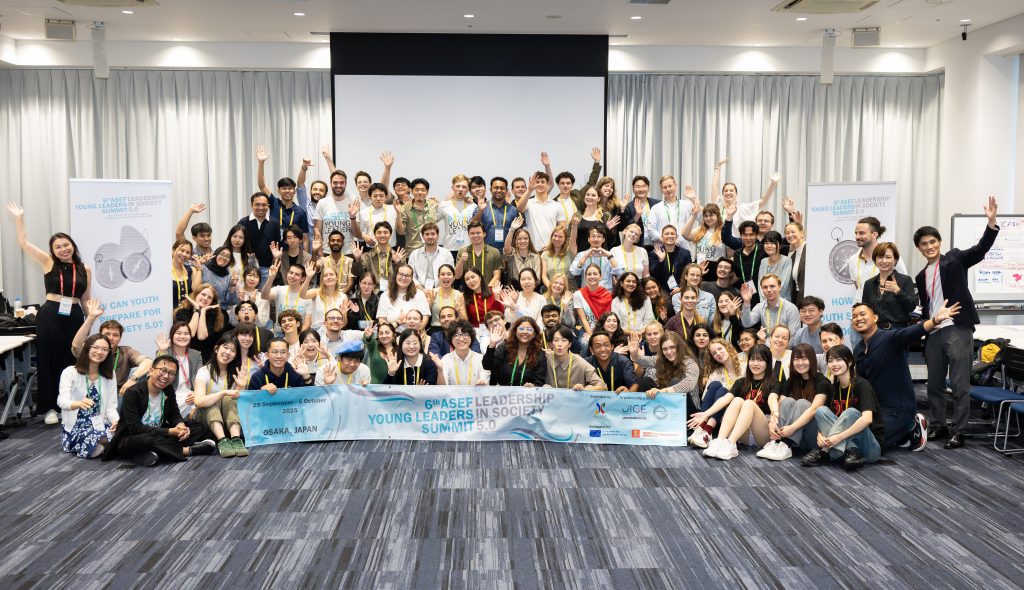
Interested in learning more about the 6th ASEF Young Leaders Summit and the in-person Youth Summit? See the full programme here.
Text Summaries written by Ms Momoko AMEMIYA.
Following the In-Person Youth Summit, the participants are encouraged to go back to their communities to share their learnings and continue with the work.
Keep a look out on our website and on social media for the publication of the Summary Reports from each team on their Case Studies from Asia and Europe on how to solve societal challenges using technology. More information can be found below.

